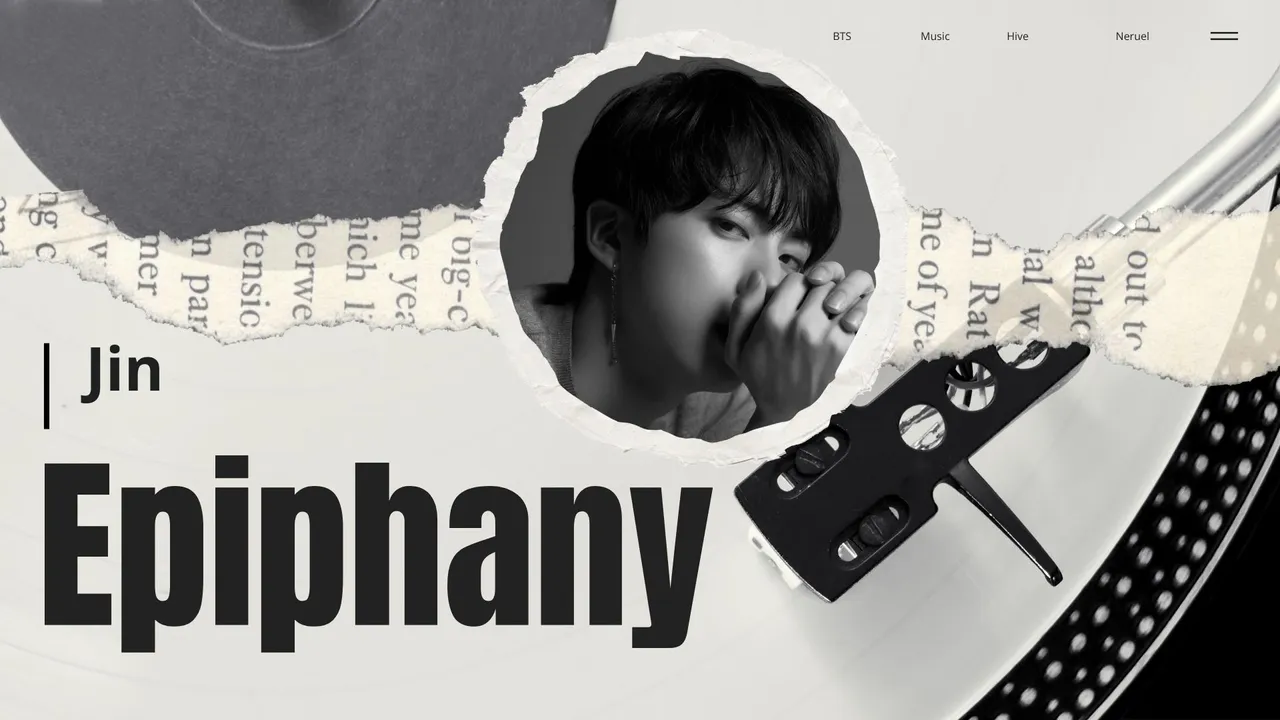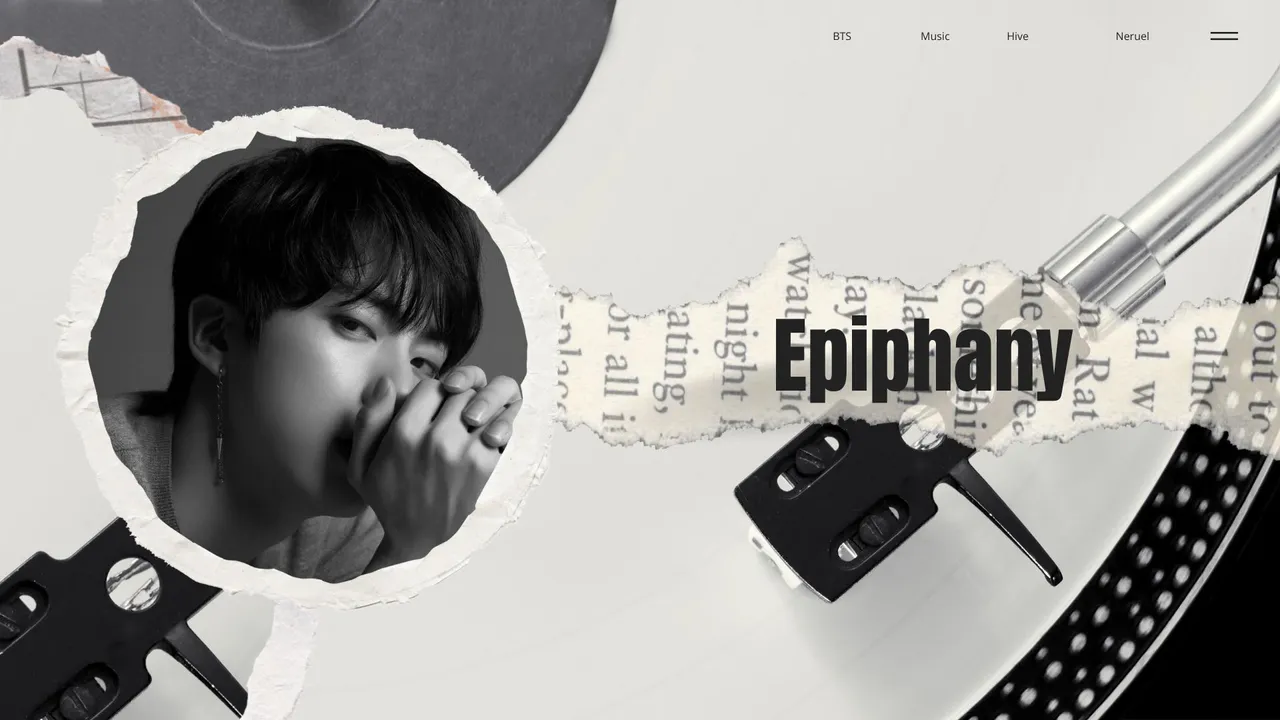
El cielo es monocromático. El viento circula y mueve suavemente las hojas de los árboles. No es primavera, ni tampoco es otoño. Es solo el principio de un maremoto de comprensiones internas o sosiegas. Una expresión perfecta, mezclada con la emocionalidad de una voz que desgarran y hace pensar que debes cambiar. Eso es “Epiphany” de Jin.
Qué raro, seguramente me amaba tanto. Esa es la primera estrofa de esta canción, cargada de un autoanálisis y de valoración propia. Quiero y deseo mantenerme sereno para expresar conscientemente lo que pienso. No es una carga, ni tampoco una insensatez. Para mí, es la expresión y la muestra de lo que una sola canción puede hacerte sentir.
Epiphany forma parte del álbum “Love Yourself” de BTS. Sin embargo, es una canción interpretada en solitario por Jin y, a pesar de ser muy serena, posee algo dentro de ella que conmueve. Todo esto se debe a que profundiza en las emociones de la persona que decidió escucharla. Es un tema musical suave, pero desgarrador.
La canción, en efecto, es una balada que usa perfectamente el concepto de autocomprensión y aceptación. Aceptarte como eres es muy difícil; aceptar tus errores y debilidades requiere un esfuerzo continuo y de comprensión que es muy raro. Esto lo utilizaron muy bien para poder establecer la letra de “Epiphany”.
Lo más interesante y lo que me gustó cuando escuché “Epiphany” por primera vez es que Jin no se muestra vulnerable; quizás, por ser el miembro de BTS que posee mayor edad, es más reflexivo. Él busca compartir un proceso, ese proceso es de revelación personal. La revelación ocurre por las dudas que el oyente posee sobre sí mismo. Quiero ser claro: “Epiphany” no es un tema musical interpersonal, sino direccional. Es para la persona que ha decidido oírla.
Al escuchar la primera nota de la canción, comienza la reflexión profunda. Además, la estructura musical es totalmente sobria y minimalista, de allí que Jin pueda expresar lo que piensa como vocalista de manera direccional. No hay distracciones en el tema, todo es certero. Existe una serenidad y presencia de un piano delicado. El espacio o entorno de la música es introspectivo, lo que posibilitó que la voz de Jin y cada una de las palabras de la letra de “Epiphany” estén en primer plano.
Es llamativo que la instrumentación sea sencilla, pero a medida que avanza la canción, esta va creciendo. Parte de una sutileza hasta llegar a un punto muy cargado que refleja experiencias sencillas que se transforman en algo poderoso y significativo. Es decir, genera un espacio de crecimiento progresivo. ¡Increíble, ¿verdad?!
Durante toda la canción, la estructura se desarrolla en forma de narrativa. La narrativa es el proceso de autodescubrimiento de Jin como persona. Esta estructura en temas musicales es muy difícil de alcanzar, porque convierte la música en una historia. La historia, para que pueda ser expresiva, debe ser muy emocional.
Se puede notar que los versos iniciales, suaves y llenos de reflexión, se mezclan con cada uno de los puntos fuertes de “Epiphany”. Esto lo puedo llamar evolución; es algo que ocurre de manera paulatina. A mi modo de ver, esto representa lo que la canción transmite: el paso entre la duda y la aceptación propia, la salida de la oscuridad hacia la luz.

Evidentemente, el contraste del inicio de la canción muestra el proceso que he indicado anteriormente. Por ello, ocurre ese auge en la instrumentación que hace sentir que todo ha cambiado. Cambió porque era necesario aceptarte. En efecto, este es un proceso emocional, psicológico, humano, artístico y musical.
Lo que hace más fascinante a “Epiphany” es la sencillez que se convierte en una poderosa herramienta para transmitir un mensaje fuerte de manera serena. La balada técnicamente se caracteriza por tener una pureza de pop contemporáneo llena de simplicidad. Por eso, es minimalista. El arreglo moderado, el sonido del piano, el sonido de las cuerdas y la voz de Jin son los protagonistas de una escena única. Ahí es donde ocurre la magia, la convergencia artística.
Para mí, la relación entre la música y la letra es demasiado orgánica; es más, cuando Jin canta las siguientes palabras: “Soy a quien debería amar en este mundo”, la música cambia, toma esa liberación necesaria y consolida el mensaje que desea transmitir. Cada acorde se convierte en una afirmación de amor propio, una tan fuerte y poderosa que resuena en los oídos.
La letra de “Epiphany” es un diálogo con el ser interior y evoca perfectamente la lucha contra la búsqueda de la validación externa y la inseguridad. Jin desvela con su hermosa voz una guerra originada por la búsqueda de la aceptación del mundo para concluir o darse cuenta de que la única validación necesaria es la de sí mismo. Las dudas y la aceptación se entrelazan para generar un poder que resalta en cada entonación. Siento que puede desgarrarte, pero si quisiste vivir tu vida por ti, lo único que importa es ser quién eres. Por eso, por esa razón me gusta esta canción.
Nota: Selecciona la opción de subtítulos del video y traduce a inglés u otro idioma. Contenido original de @neruel. Todos los derechos reservados ©, 2024. Diseño: Canva. Traducción al inglés y corrección gramatical: Chatgpt - DeepL - Languagetool - QuillBot. Imagen: WIKI.
ENGLISH VERSION (click here!)
Epiphany: The Power of Self-Love by Jin
The sky is monochromatic. The wind flows and gently moves the leaves of the trees. It’s neither spring nor autumn. It’s just the beginning of a tsunami of internal understandings or calmness. A perfect expression, mixed with the emotionality of a voice that tears at you and makes you think you need to change. That’s "Epiphany" by Jin.
How strange, he must have loved me so much. That’s the first verse of this song, filled with self-analysis and self-valuation. I want and wish to remain calm to consciously express what I think. It’s not a burden, nor is it nonsense. For me, it’s the expression and demonstration of what a single song can make you feel.
"Epiphany" is part of BTS’s Love Yourself album. However, it is a song performed solo by Jin, and despite its serene tone, there’s something within it that moves you. This is because it delves into the emotions of the person who decided to listen to it. It’s a soft, yet heartbreaking track.
The song is indeed a ballad that perfectly uses the concept of self-understanding and acceptance. Accepting yourself as you are is very difficult; accepting your mistakes and weaknesses requires continuous effort and understanding, which is very rare. They used this concept very well to establish the lyrics of "Epiphany."
The most interesting thing, and what I liked when I first listened to "Epiphany," is that Jin does not present himself as vulnerable. Perhaps, being the oldest member of BTS, he is more reflective. He seeks to share a process, a process of personal revelation. The revelation happens because of the doubts the listener has about themselves. I want to be clear: "Epiphany" is not an interpersonal song but a directional one. It’s for the person who has decided to listen to it.
When you hear the first note of the song, deep reflection begins. Also, the musical structure is entirely sober and minimalist, which is why Jin can express what he thinks as a vocalist in a directional way. There are no distractions in the song; everything is precise. There is a serenity and presence of a delicate piano. The space or environment of the music is introspective, which allowed Jin’s voice and every word of the lyrics in "Epiphany" to be in the forefront.
It’s striking that the instrumentation is simple, but as the song progresses, it grows. It starts with subtlety, eventually reaching a very charged point that reflects simple experiences transforming into something powerful and meaningful. In other words, it creates a space for progressive growth. Incredible, right?
Throughout the song, the structure develops as a narrative. The narrative is Jin’s process of self-discovery as a person. This structure in music is very difficult to achieve because it turns the song into a story. For the story to be expressive, it must be highly emotional.
You can notice that the initial verses, soft and filled with reflection, blend with each of the song's strong moments. I would call this evolution; it’s something that happens gradually. In my view, this represents what the song conveys: the transition between doubt and self-acceptance, the shift from darkness to light.
Evidently, the contrast at the beginning of the song shows the process I mentioned earlier. That’s why the surge in the instrumentation occurs, making you feel like everything has changed. It changed because it was necessary to accept yourself. Indeed, this is an emotional, psychological, human, artistic, and musical process.
What makes "Epiphany" even more fascinating is the simplicity that becomes a powerful tool to convey a strong message in a serene way. The ballad is technically characterized by a purity of contemporary pop full of simplicity. That’s why it’s minimalist. The moderate arrangement, the sound of the piano, the sound of the strings, and Jin’s voice are the protagonists of a unique scene. That’s where the magic happens, the artistic convergence.
For me, the relationship between the music and the lyrics is so organic; in fact, when Jin sings the following words: “I’m the one I should love in this world,” the music changes, taking that necessary release and solidifying the message he wishes to convey. Each chord becomes an affirmation of self-love, one so strong and powerful that it resonates in the ears.
The lyrics of "Epiphany" are a dialogue with the inner self and perfectly evoke the struggle against the search for external validation and insecurity. Jin unveils with his beautiful voice a war born from the quest for the world’s acceptance to conclude or realize that the only validation needed is from oneself. Doubts and acceptance intertwine to generate a power that stands out in every intonation. I feel like it could tear you apart, but if you wanted to live your life for yourself, the only thing that matters is being who you are. That’s why, for that reason, I like this song.
Note: Select the subtitle option of the video and translate to English or another language. Original content by @neruel. All rights reserved ©, 2024. Design: Canva. English translation and grammar correction: Chatgpt - DeepL - Languagetool - QuillBot. Image: WIKI.